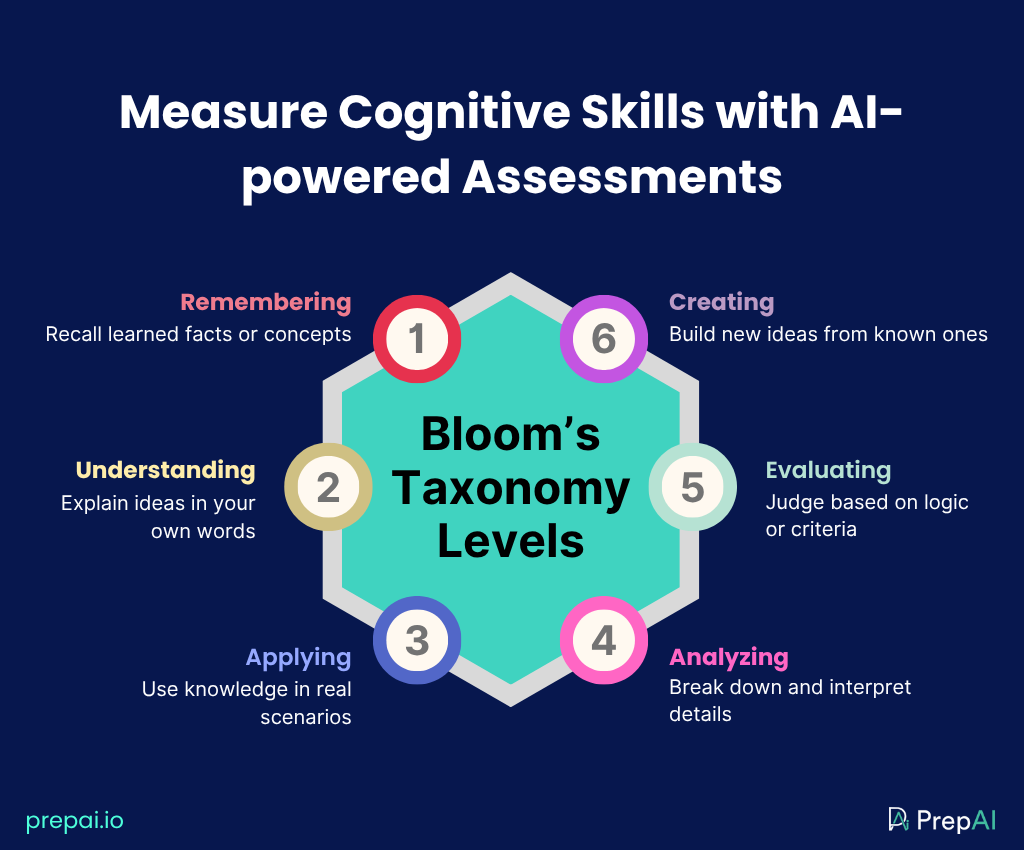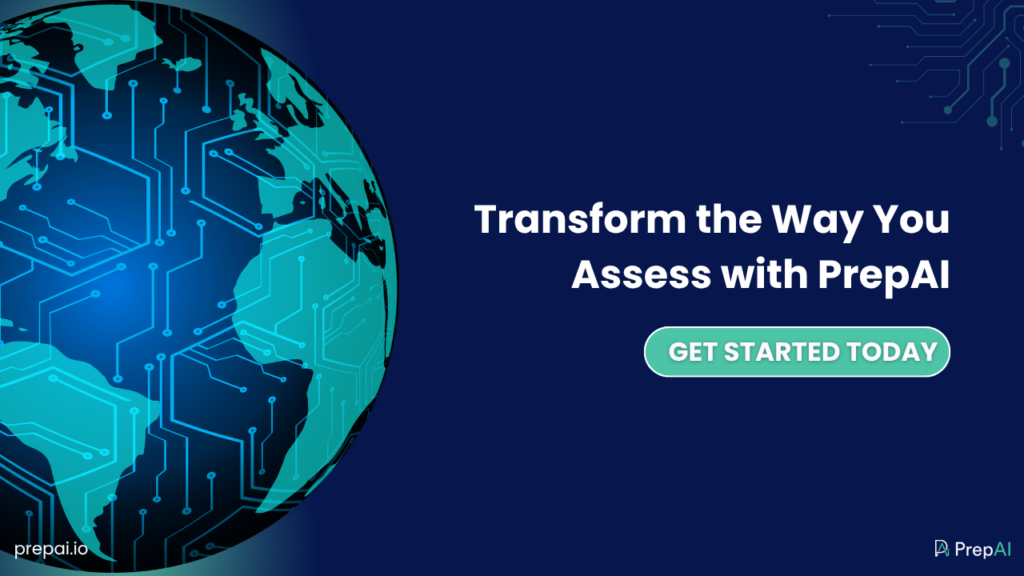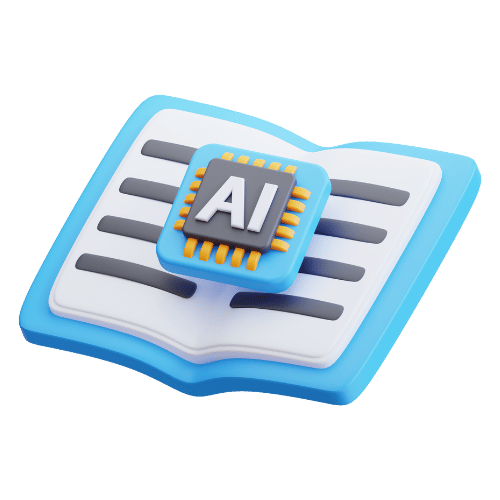AI in question generation is a time-saving, cost-effective, and user-friendly solution. Here, we’ll discuss the importance of analytical questions and how AI helps create them to conduct meaningful assessments for diverse purposes.
AI-powered assessment tools have changed the way people look at quizzes and exams. Be it teachers, coaches, or trainers. Be it in educational institutions, content creators, or business organizations, AI question creation tools continue to save time and resources for many.
Simply put, the tools use artificial intelligence algorithms to understand the input and generate a set of questions as the output. An AI question answer generator like PrepAI has an auto-grading feature to provide instant results after the test. Additionally, the admins can use the data-driven insights available in the dashboard to identify patterns and share personalized feedback with the test-takers.
However, some misconceptions about using AI in question generation limit the quality of questions or the type. Many people think AI tools can only create multiple-choice questions (MCQs). That’s far from the truth. While some AI test tools are indeed limited to MCQ-type questions, many leading ones are more versatile and diverse. For example, you can create analytical questions with PrepAI and test the higher-order thinking skills (HOTS) of the participants.
Let’s find out more about how AI tools can create deeper and analytical questions.
Building Confidence with AI Assessment Tools
Whether in classrooms or during employee training sessions, assessments can be used to build confidence in participants and help them identify their strengths, weaknesses, and capabilities. Using AI tools allows the faculty to create high-quality assessments while having control over the process. After all, AI is not a replacement for human experience but a supporting technology.
Let’s consider artificial intelligence in education as an example. AI tools don’t replace teachers. Instead, they help teachers streamline their teaching and administrative activities to save time and energy. With AI assessment tools, teachers can create surprise quizzes, class tests, exam papers, etc., to measure the abilities of their students and discuss the results with each of them. This builds confidence in the students by highlighting their skills and strengths. Students who perform well in the tests will feel eager and excited to do better. They will pay more attention during the lessons, ask questions to clarify their doubts, and study harder to do even better in the subsequent tests.
The analytical insights provided by the question-answer generator tools help teachers work with students to improve their weak areas. It inspires confidence that they can achieve their goals and continuously improve their skills, knowledge, and abilities.
Measure Cognitive Skills with AI-powered Assessments
Thinking, learning, evaluating, analyzing, decision-making, etc., are cognitive skills. These are mental abilities that determine whether a person can pay attention to details, understand what they see/ read, remember the contents, and apply the knowledge in real-life scenarios.

AI assessment tools are not limited to multiple choice question generators. They are much more powerful and can create questions that test the various levels of cognitive learning skills. PrepAI is supported by Bloom’s Taxonomy framework, a hierarchical model developed by Benjamin Bloom in 1956. The levels were revised in 2001 and arranged in a pyramid from simple to complex as follows:
- Remembering
Retaining the knowledge gained from classrooms, training programs, coaching, etc.
- Understanding
Not just reproducing the learned contents from memory, but knowing what the concepts actually mean and what they imply.
- Applying
Using the knowledge to perform a task or an activity in real life or during an exam in a different or new context.
- Analysing
Breaking down the details, looking at the bigger picture, or considering the information from another perspective to understand its structure, context, pattern, etc.
- Evaluating
Measuring a piece of content against certain criteria or standards to determine its value and arrive at a conclusion.
- Creating
Using existing knowledge and information to come up with new, unique, or different ideas, solutions, etc.
By using AI for analytical questions, users can effectively measure and assess the cognitive skills and abilities of test-takers. When hiring new candidates, this helps recruiters choose the ones that are the best fit for the job requirements. For example, if the opening is for a mid-level managerial role, the recruitment tests can be conducted using AI tools and focus on analytical questions to determine the problem-solving, decision-making, crisis management, and leadership skills of the candidates. This also reduces the risk of human bias and helps HR teams shortlist worthy candidates based on their skills.
Diverse Question Types for HOTS
A question generator from text like PrepAI supports varied question types like true/ false, fill-ups, open-ended descriptive questions, matching, and crossword puzzles, apart from MCQs. This makes the test paper more effective and comprehensive.
For example, true or false questions can measure knowledge retention abilities while assessing misconceptions. They can include trick questions that make the participant understand the statement before answering.
Fill-in-the-blanks reduce the guesswork included in MCQs and true/ false questions. The participant has to have specific knowledge of the subject to provide the correct answer. At the same time, it’s a time-saving method as there’s no need to write lengthy answers.
Matching questions are highly adaptable for various HOTS levels. They show whether the participant has clarity on the topic or if they are simply guessing the answers. Moreover, large amounts of data can be covered in a short time.
Crosswords can be created quickly using AI in question generation. They are brain teasers and are known to test various abilities like language proficiency, general knowledge, technical knowledge, pattern recognition abilities, and other cognitive skills. They also test the memory power and application skill levels.
Descriptive questions require short or essay answers describing the details, explaining a situation or theory, justifying a statement (or negating it), or creating a new solution to the given problem. It is adaptable across all levels of LOTS and HOTS and gives an insight into how the participant understands the questions and presents the answer.
Other Benefits of Using AI in Question Generation
Saving time is one of the major benefits of using AI tools. Recurring manual tasks are automated using powerful algorithms. At the same time, users have control over the tool as they can edit the questions generated by it and select the ones that align with their requirements.
Moreover, most AI question answer generator tools are scalable and can be integrated with third-party software like LMS (learning management systems), HRMS (human resource management systems), ERP (enterprise resource planning) software, and CRM (customer relationship management) solutions. This allows users to create and conduct tests through a single interface and store the data in their systems (cloud and/ or on-premises).
With flexible subscription and pricing options, educational institutions and businesses can generate unlimited questions using AI tools.

Final Words
The role of AI in question generation is versatile and reliable. By choosing assessment tools like PrepAI, users can create high-quality tests with deeper and analytical questions to get a comprehensive report on the skills and abilities of the test takers.
Go beyond multiple-choice questions and explore the benefits of AI tools to conduct cognitive, technical, personality tests, and more for various requirements and on any scale.
Talk to us today!



